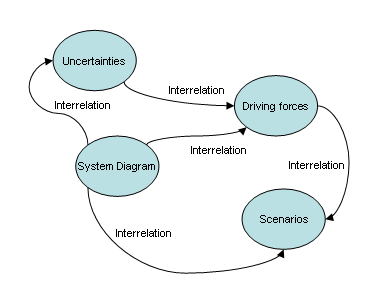Difference between revisions of "Brian Chiu's learning log"
| Line 4: | Line 4: | ||
'''System Thinking''' | '''System Thinking''' | ||
<center>[[Image:Afterimage.png||Logic Process]]</center> | <center>[[Image:Afterimage.png||Logic Process]]</center> | ||
The most useful discovery for me is that scenario thinking actually is an iterative process from single to complex and then to simple. At the beginning, we assume the future as a matter of course. The internet TV will develop bigger and bigger, the customers will get more chooses for the on demand entertainment solutions. So we can say the future runs at only oneway. However, things do not go well as we expect. Alternative new technology may rise and change our life and business world completely; Govenrnment reglation could become the bottleneck of the development of Internet TV; | The most useful discovery for me is that scenario thinking actually is an iterative process from single to complex and then to simple. At the beginning, we assume the future as a matter of course. The internet TV will develop bigger and bigger, the customers will get more chooses for the on-demand entertainment solutions. So we can say the future runs at only oneway. However, things do not go well as we expect. Alternative new technology may rise and change our life and business world completely; Govenrnment reglation could become the bottleneck of the development of Internet TV; User's expectation varies from appointment viewing, random selection to interactive way; the conflict in IP leagel aspect may result in the recession of it as well. All of which add the uncertainty to the current situation and the future become plausible to us. | ||
By the help of system mapping and driving forces, we can figure out all entities in current circumstance and therefore understand the relationship between them. Thirdly, finding the key uncertainty and developing the scenarios give us a simplified future. Under certain assumption, we can see the way before us and where the destination is. So we get our simple future. | By the help of system mapping and driving forces, we can figure out all entities in current circumstance and therefore understand the relationship between them. Thirdly, finding the key uncertainty and developing the scenarios give us a simplified future. Under certain assumption, we can see the way before us and where the destination is. So we get our simple future. | ||
| Line 20: | Line 20: | ||
Messy is good | Messy is good | ||
help you get whole picture | help you get whole picture | ||
However, solving one problem almost always others | |||
'''Creative Thinking''' | '''Creative Thinking''' | ||
Revision as of 10:42, 15 May 2006
Butterfly Effect Butterfly Effect
System Thinking

The most useful discovery for me is that scenario thinking actually is an iterative process from single to complex and then to simple. At the beginning, we assume the future as a matter of course. The internet TV will develop bigger and bigger, the customers will get more chooses for the on-demand entertainment solutions. So we can say the future runs at only oneway. However, things do not go well as we expect. Alternative new technology may rise and change our life and business world completely; Govenrnment reglation could become the bottleneck of the development of Internet TV; User's expectation varies from appointment viewing, random selection to interactive way; the conflict in IP leagel aspect may result in the recession of it as well. All of which add the uncertainty to the current situation and the future become plausible to us.
By the help of system mapping and driving forces, we can figure out all entities in current circumstance and therefore understand the relationship between them. Thirdly, finding the key uncertainty and developing the scenarios give us a simplified future. Under certain assumption, we can see the way before us and where the destination is. So we get our simple future.
Methodology
Convergence
Assumption
Action Plan
Messy is good
help you get whole picture
However, solving one problem almost always others
Creative Thinking
Best Strategy